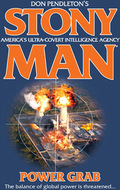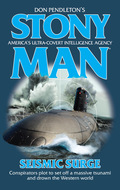Kitap dosya olarak indirilemez ancak uygulamamız üzerinden veya online olarak web sitemizden okunabilir.
Kitabı oku: «Decision Point»
Law of the jungle
The Pacific Rim’s most vicious human predators, the Liberation Tigers of Tamil Eelam, are on the move again. But old-school terror tactics have given way to a more clandestine approach to hijacking global power. The Tigers have grassroots fundraising inside the United States and the death of a uniquely positioned software engineer tips to something big in the works. A young woman from a powerful family is ransomed at the same time a powerful new technology is stolen. Following the trail of both, Mack Bolan finds that it leads to Singapore and the murky waters of the Bay of Bengal. The Tigers have acquired a top secret satellite and soon the terror will go online.
Staying one step ahead of their stone-cold pursuer and finding refuge in their fortified compound, the Tigers and their calculating leader give Bolan a fight for his life. He’s willing to pay that price, but he’ll take the terrorist leader and his pirates to hell with him for their crimes.
The guards charged into the house
Shots rang out as they fired blindly at Bolan’s shadow, and he ducked back into the room. Dilvan and Faizal were still battling, and he was running out of options.
Dilvan stumbled backward, knocking a computer monitor to the floor, and Bolan took aim with his 9 mm pistol. Just as he fired, Faizal jumped forward, pushing the younger man out of the way.
“Why the hell did you do that?” the Executioner asked as his friend fell to the floor.
“He beat me at the keyboard. We need him.”
Bolan looked up in time to see Dilvan through the door and rolled to his feet. But he was too slow. The bullet from the close range pistol tore through the air. He felt the impact, knew he was hit, and then the cold darkness took him.
Decision Point
Don Pendleton

All forms of tampering with human beings, getting at them, shaping them against their will to your own pattern, all thought control and conditioning is, therefore, a denial of that in men which makes them men and their values ultimate.
—Isaiah Berlin
1909–1997
A person must accept responsibility for his or her own actions, no matter the cost. But when someone takes away your free will and your ability to act, others have to get involved.
—Mack Bolan
Special thanks and acknowledgment to Dylan Garrett for his contribution to this work.
Contents
CHAPTER ONE
CHAPTER TWO
CHAPTER THREE
CHAPTER FOUR
CHAPTER FIVE
CHAPTER SIX
CHAPTER SEVEN
CHAPTER EIGHT
CHAPTER NINE
CHAPTER TEN
CHAPTER ELEVEN
CHAPTER TWELVE
CHAPTER THIRTEEN
CHAPTER FOURTEEN
CHAPTER FIFTEEN
CHAPTER SIXTEEN
CHAPTER SEVENTEEN
CHAPTER EIGHTEEN
CHAPTER NINETEEN
CHAPTER TWENTY
CHAPTER TWENTY-ONE
CHAPTER TWENTY-TWO
CHAPTER TWENTY-THREE
CHAPTER TWENTY-FOUR
CHAPTER ONE
The waters of the Malacca Strait were gray and choppy, mirroring the low-slung clouds overhead. Heather Daniels stood at the rail of the supply ship Favor’s Pride and watched Singapore slowly fade into the distance. For all her travels, she’d never been in a place quite like it. Singapore was a city of contradictions—beautiful, modern architecture, neon lights and all the technological conveniences of the United States crashed against old, run-down buildings, poor sanitation and desperate poverty. Like many of the other cities she passed through, Singapore wasn’t a place she would miss, but then again, her purpose there had only been to secure supplies for the next stop on her voyage.
Once they’d cleared the Malacca Strait, the ship would bear northwest toward the Andaman Islands and Port Blair, right in the middle of the Bay of Bengal. The small city was serving as a staging area for tsunami relief efforts in Sri Lanka and other parts of Indonesia. It was also a holding area for the hundreds of displaced and lost children, whose parents had either disappeared or died in a disaster that had claimed thousands of lives.
Four years as a nurse practitioner had given Heather the skills she would need to help with the many medical needs of the children, but her true calling was her work as a missionary, trying to bring a little faith and light to those who desperately needed it. As far as Heather was concerned, spiritual needs were just as important as medical ones. Maybe more.
As the ship began tacking north, she turned away from the rail. The ship wasn’t fancy, but she would be comfortable enough in her small cabin, though the heat would probably be stifling. The first mate, a man named Simmons, was making his way across the deck and paused, tipping his seaman’s hat politely. He was tall and lanky, with several days’ growth of beard on his face and scraggly black hair that looked to be in need of a good washing. He’d also been friendly and polite.
“You doing all right?” he asked, settling the hat back on top of his head. “Not the kind to get seasick, are you? If so, you’d best stay by the rail and watch the horizon. That’ll help.”
“I’m fine, thank you,” she said. “And I don’t get seasick. How long until we make Port Blair?”
“If the weather holds in the Strait, we should be there within a few days. This old tub isn’t fast, but she’s steady.” He rubbed his stubbled jaw contemplatively.
“And if it doesn’t?” she asked.
He shrugged. “Then we’ll get there when God says we should.”
She laughed lightly. “That will be true in any case, my friend.”
He laughed and headed toward the bow, while she moved on toward her room. Once in her cabin, Daniels settled onto her bunk, opened her briefcase and pulled out the small laptop. The computer was a necessity for keeping track of the numerous organizational details, but it was also her one indulgence allowing her to journal and communicate with family and friends. A small guilty pleasure filled her as the computer whirred to life and pictures from home popped up on her screen. She kissed the tip of her finger and pressed it against the picture of her family clumped together on the porch.
Knowing that she wouldn’t be able to send it until they reached Port Blair, Daniels began the draft of a letter to her father. They had a strange relationship that was complicated by the fact that just over eight years ago he’d been the President of the United States. Now he traveled all over the world giving lectures and playing the role of diplomat as much as a man who was known behind his back as President Iron Ass could do so. Jefferson Daniels didn’t particularly approve of her chosen vocation. Mentally, she corrected herself. He approved of the vocation—missionary work was a wonderfully valuable thing in the world. He didn’t approve of her being a missionary. The risks, he’d often told her, were far too great. She was his only child and he was overprotective, but she loved him dearly.
Daniels snuggled back into her bunk as the boat rocked its lullaby with the waves. Favor’s Pride wasn’t a particularly fancy ship, nor was she speedy. Most supply ships she’d been on weren’t. With a cruising speed of about twelve knots, no journey was going to be fast, but the steady thrum of the engines was reassuring, and the crew seemed capable. She scrolled through her supply lists and noted what she would need from the next group of missionaries that would be out the following month.
This time on the ship, she knew, was only a brief lull before the hard work really began, and it was important to get her rest. She shut her laptop down for the night and decided to doze until it was time for the evening meal.
FORTY HOURS INTO THE journey, more than halfway there, the sound of booted feet running on the metal deck caught Daniels’s attention. In her experience, sailors didn’t run unless something fairly dire was happening, and unless the weather had suddenly changed, the skies had been clear that morning. She closed her laptop and set it aside before moving to the small porthole that served as a window in her tiny cabin. Three more people ran past, and she turned and moved to the door. Her instinct was to throw it open and rush out to see what was going on, but she had spent enough time in dangerous places to know that caution would serve her better in this situation.
She peered through the porthole in the door and felt her entire body tense as two men with guns ran through the short hallway toward the bow of the boat. Both of them were wearing all-weather coats with a large patch on the back, depicting a great white shark with an eye patch curled tightly around a half skull sitting atop a pile of gold. A shudder of panic ran through her body as she realized that these could only be pirates of some kind. The Bay of Bengal had been a haven for pirate activity for years, and the countries affected appeared unable to do anything serious to curtail it.
Shots rang out and Daniels involuntarily flattened herself against the bulkhead. She needed to hide, and fast, before she was found. Running to her bunk, she grabbed her medical bag and the precious laptop, stuffing it in on top. She quickly slung it over her head, then grabbed a rubber band off the tiny table next to her bunk and pulled her long, brown hair into a ponytail, so it would be out of the way. Her mind raced as she considered ways that she might get off the boat and came up with only one idea. The pounding of footsteps on the metal plating of the deck outside, the shouting of orders and demands, made her heart race.
Daniels ducked low as she moved to the door. She heard more shouting as the pirates began rounding up the few passengers aboard, along with the still-struggling crew. Forcing herself to breathe, she waited for the sounds to move toward the bow, and when they did, she risked one peek through the porthole, then swung open the door. Her only chance was the stern, where an emergency launch boat was stored. She ran for it, trying to keep her steps as light as possible, but her feet contacting the metal rang out like a gong to her ears.
A shot tore through the air in reply to a sudden yell of anger, and Daniels felt her heart stutter in her chest. Risking a glance over her shoulder, she saw two men lifting a body over the railing. The first mate. She didn’t stop moving, because there was no place to hide, anyway, but the emergency launch was in sight.
She could hear their boots connecting with the deck and ignored the yelling once they spotted her. Daniels could see the boat, but knew she could never get it launched. She ran to the railing and looked down at the water being churned up from the propellers, just as the high-pitched whine of a bullet passed over her shoulders.
“That would not be a wise choice.”
She froze, slowly raising her hands. The low, accented baritone sent a chill up her spine. She turned to see a tall man with a scar across his cheek staring at her. He took a long drag on the cigarette he held. If he wasn’t trying to kill her, she might have thought he was handsome, but the gun pointed at her squashed that flickering thought.
Daniels took a deep breath and tried to remember her father’s advice about panic. “Being scared to death is fine,” he’d once said. “Just don’t let your enemies see it.”
She pushed her shoulders back and stared into the man’s dark brown eyes. “I don’t know, chopped up by a propeller seems a little more merciful than raped and tortured by thugs.”
For almost a full minute he simply looked at her, then a smile touched his lips. “It appears that our catch today is more lucky than we could’ve known. Some days the sea favors the fisherman more than the fish.” He offered an odd little half bow. “It is a pleasure to meet you, Miss Daniels.”
“You know who I am,” she said. It wasn’t a question. “Then you know that harming me would be a disastrous choice on your part. The U.S. doesn’t take kindly to its citizens being kidnapped, especially ones that belonged to the first family.”
“We’re not here to hurt anyone,” he said. “It’s not profitable.”
“Tell that to the guy that was filled with holes and dumped over the rail.”
“An unfortunate necessity. This is not the White House and you will not find anyone waiting for you in the West Wing. Here things are not so easy to discern,” he said, shrugging. He pointed at her shoulder bag. “What are you carrying in your bag?”
“Medical supplies,” she said. “I’m a nurse.”
“Give it to me,” he demanded. When she hesitated, he gestured impatiently with his gun. “Now.”
She handed it over to him and he opened it and removed the laptop. “This is not a medical supply,” he said. Without another word he flung it over the rail and Heather watched it disappear into the water. Part of her heart sank along with it. Two years of missionary work was detailed on that hard drive—her journal chronicling the highs and lows of the life she’d chosen, her joys and her failures, not to mention GPS tracking—all gone in a brief, floating moment.
He finished digging through the bag and then returned it to her. “Come with me,” he said, gesturing with the gun once more. “My name is Daylan Rajan. I’m in charge of this group. I know you Americans like to cause trouble, but if you can manage to behave yourself you will be allowed to wait with the other passengers until we reach a safe harbor.”
“And if I don’t?”
“Then you will be bound and gagged and tied to the railing where I can keep an eye on you.”
“I guess I’ll go with option one. Where are we going, anyway?” she asked, heading toward the bow where the other missionaries and crew were being held.
“An island that does not welcome outsiders,” he said. “Once we are there, the commander will decide what to do with you.”
She stopped and looked back at him. “You speak fluent English,” she said. “And you don’t dress like a band of raggedy pirates. You’re too organized. Who are you people?”
“We are people that you don’t want to make angry,” he said. “Now move to the front of the boat.”
“You could stop this, you know,” she suggested. “Take the boat and the supplies and just let us go.”
“Supplies are helpful to our cause and we always need more vessels, but hostages are worth far more. And you are worth more than all the other hostages here combined. So you see, I cannot let you go.”
“You can,” she said shortly. “What you mean is that you won’t.”
“As you will,” he said. “Enough talking. Do not make me regret my leniency, now get up front with the others.”
Daniels nodded and kept moving, taking her place by the other hostages who huddled together for the illusion of safety. She watched carefully, trying to remember faces and names, and decided after a time that these were not pirates in any traditional sense. These were soldiers and while many of them were young—some were teenagers—they acted more like military men than the grasping pirates that haunted the waters near Somalia.
The soldiers crewed the boat, while the craft they’d arrived on gave them an armed escort. The hostages were kept up front, under constant armed guard, and only allowed to move around in the small area of the bow. It took the better part of twelve hours for them to reach their destination, a small island with a well-sheltered cove.
Numerous boats were lined up at the docks. Not far inland, she could see several buildings, including what looked like a main house. Most of the buildings were typical for the region, old wood siding with thatched roofs on stilts, but the main house was more modern. Quite large, with sloping rooftops and a large deck on one side. It was on stilts, as well, and Daniels expected that floods were quite common on many of these islands.
Unfortunately she had no real idea where she was in relationship to anything else. She only knew that they’d been traveling southeast instead of northwest. But there were dozens, maybe even hundreds, of small islands along the coast of Malaysia and this could be any one of them. Lost in her thoughts, she didn’t hear the man who was obviously the leader of this group until he cleared his throat.
“When we reach the dock in a few minutes, you will come with me,” he said. “I will present you to the commander.”
“What about them?” Daniels asked, pointing to the other hostages.
“Some will be ransomed, if there are those who can pay for them, or they will be ransomed as part of a larger arrangement. The others will find a different fate.”
“You will kill them, then,” she said, trying to contain her anger and despair. “How pointless.”
“You have come to a very dangerous part of the world, Miss Daniels,” he said. “Do not presume to know anything about us.”
He stood next to her as the boat reached the dock, then he motioned for her to precede him down the gangplank. She stopped and looked out over the island once more. The pier where the boat was moored was not suited for the large vessel, which dwarfed the other boats that were in port. Trucks were lined up, waiting for the stolen cargo to be unloaded, as soldiers moved some of the passengers along the dock including the other missionaries.
“Let’s go.” He pulled her farther down the dock.
Worried for the fate of the other missionaries, she said, “Shouldn’t I be near the other hostages?”
“You are different. They will be part of a larger negotiating package. You will be ransomed separately.”
“I don’t want to be treated any differently than anyone else,” she snapped.
He stopped and spun. His eyes bored into her, dark and fierce.
“Sometimes, it is necessary to kill a hostage or even several to make a point. If you are with them and this happens, you would be just as likely to be chosen for death as the others, as no one but myself knows your true identity. If you want to live, you come with me. If you want to take your chances…” He shrugged and released her hand. “Then go with them.” He pointed to where the other hostages huddled in a small group.
One man was yanked to his feet in front of a video camera. He attempted to flee, but the pirate was quick and efficient, slitting his throat with a large blade, as the other hostages screamed in horror. The crimson spray splattered all of them, adding to the terror of the scene. The man’s body dropped to the deck. Daniels looked at Rajan.
“This is not a game, Heather.” He pointed at a dark sedan rolling to a stop on the edge of the pier. “The man who is about to get out of that car is Kabilan Vengai, the leader of the Ocean Tigers. He is not a patient or kind man, so keep your answers short and direct.”
The combination of Rajan’s warning and the arrogant stride of Vengai as he moved down the pier had Daniels cringing inside. His arrival brought the activity on the pier to a near standstill. Everyone watched as he approached. He was about her height, just under six feet, and reminded her of a tiger stalking its prey. The military-style clothing didn’t hide the scars on his arms that looked as if someone had tried to fillet them and, failing that, had burned the skin.
Rajan didn’t wait for him, but closed the distance and started his report. Daniels caught only every few words, but what she did understand was the look of disdain that Vengai was sending her way. They finished speaking and Vengai strolled in front of her, looking her up and down as though she were a particularly interesting painting rather than a person.
“I did not believe it when Rajan first told me, but he is right. You are the daughter of President Jefferson Daniels of the United States.”
“He’s not the President anymore,” she said. “Just a man.”
Vengai chuckled under his breath. “If you believe that, you must think quite poorly of him. No man is ever an ex-President of your country, for he is still addressed as Mr. President, is this not so?”
She bit her lip and nodded her agreement.
“You are truly a treasure fished from the sea and were you my daughter, I would never allow you to travel in such a dangerous place as the Bay of Bengal. What will he pay, I wonder, for your safe return?”
Remembering her father’s time in office, Daniels shrugged. “I doubt he’ll pay you anything,” she said, trying to hold on to her courage. “President Jefferson Daniels does not negotiate with terrorists.”
Vengai chuckled once more. “He will for you,” he said. “You see, presidents and politicians like to say things like that, but they only mean that for other people. They never mean it when it will actually affect them. He will negotiate for you, of this I am very certain.” He reached into his jacket pocket and pulled out a cell phone. From another pocket, he removed a small business-card-size piece of paper. He dialed a series of numbers, then handed the phone to her. “Call him. Now.”
She took the phone and saw that all the prefix numbers were entered. She added the area code and phone number for her father’s cell phone, then pressed Send. After several long seconds and a handful of clicks and beeps, the call connected.
Her father answered on the second ring. “Who’s this?” he said.
“Dad, thank God you answered, it’s me,” Daniels said. “Don’t hang up.”
“Heather, where are you calling from? I didn’t recognize the number.”
Before she could respond, Vengai snatched the phone from her hand, activating the speaker-phone function. “President Daniels, now you know that your daughter is alive, we can proceed with business. We are holding your daughter and if you want to see her alive again, you will follow my instructions exactly.”
“Who the hell are you?” her father snarled. “Where is she?”
“This will be the only call, Mr. President, so I suggest you write down what I’m about to tell you. Within ten days, you will transfer…twenty-five million dollars in U.S. funds into the following account.” He rattled off a string of numbers. “When the money is received, your daughter will be released. That is all.”
“Dad!” Daniels said. “I’m on an island somewhere near—” The slap that interrupted her came out of nowhere and she couldn’t stifle the yelp of pain as she went down. Rajan was standing over her.
“Ten days, Mr. President, or your daughter dies.”
He clicked the end button on the sound of her father’s nearly incoherent yelling.
“This is all so unnecessary,” she said. “We have nothing to do with your war or your money. We’re here trying to help the people of your country.”
“Miss Daniels, what you arrogant Americans seem to misunderstand is that we want no help from you. We don’t want your people in our country, but you refuse to go home and continue with these…useless efforts.”
Daniels held her tongue. She knew better than to argue with an extremist. But with her father there were two things she knew for certain. She’d never heard him sound so angry.
And he would never pay money to a terrorist, not even for her.
Ücretsiz ön izlemeyi tamamladınız.








